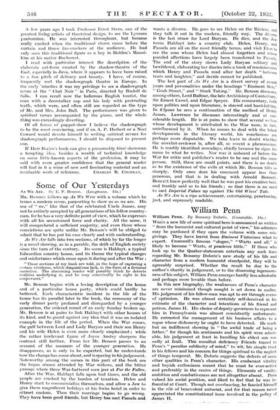Some of Our Yesterdays
As We Are. By E. F. Benson. (Longmans. 15s.) Ma. BENSON follows up As We Were with a volume which he terms a modern revue, purporting to show us as we are. His use of " we," like that of the celebrated Uncle James, may
not be entirely accepted by all generations of his fellow country- men, for he has a very definite point of view, which he expresses with all his accustomed force and clarity. All the same, it will comprehend a sufficient majority, and even those whose convictions are quite unlike Mr. Benson's will be obliged to
admit that he has put his case clearly and with understanding. As TVe Are falls into two sections, of which by far the longer
is a novel showing, as in a parable, the drift of English society since the turn of the century. Its scene is Hakluyt, a typical Edwardian country house, and its theme the typical changes and misfortunes which come upon it during and after the War :
" These sections of my book are told, in the hope of capturing a certain vividness, which disquisitions lack, in the form of a fictional narrative. The discerning reader will possibly think he detects realities underlying it, and he may conceivably be right in his conjectures."
Mr. Benson begins with a loving description of the house and of a particular house party, which could hardly be bettered. Each characteristic incident in the life of the house has its parallel later in the book, the ceremony of the early dinner party profaned and disregarded by a younger generation, the ordered round of an early Sunday broken up.
Mr. Benson is at pains to link Hakluyt with other houses of its kind, and to guard against any idea that it was an isolated example in the life of the period. When the War comes, the gulf between Lord and Lady Buryan and their son Henry and his wife Helen is even more clearly emphasized ; while the rather irrelevant figure of Joyce Anstey sharpens the contrast still further. From her Mr. Benson passes to an account of the manners of the younger generation. He disapproves, as is only to be expected, but he understands how the change has come about, and is sparing in his judgement. Noteworthy among the scenes in this part of the book are the bogus seance attended by War widows, and the bitter
passage where three War-battered men jeer at For the Fallen.
After the War, Hakluyt falls upon bad times, and the old people are crushed by the burden of taxation. Helen and Henry start to commercialize themselves, and allow a Jew to give them magnificent holidays at his Swiss hotel in order to attract custom. Then their marriage begins to go wrong.
They have been good friends, but Henry- has met Pamela and
wants a divorce. He goes to see Helen on the Riviera, and they talk it out in the modern, friendly way. The divorce is the last straw for Lord Buryan. He dies, and the Jew turns Hakluyt into a country club. Helen, Henry, and Pamela are all on the most friendly terms, and visit Eton to see the sons whom Helen had almost forgotten and whose puzzled affections have largely been transferred to Pamela. The end of the story shows Lady Buryan solitary and bewildered, elaborating her diaries into a book of reminiscences' which Henry and Pamela read after her death " between tears and laughter," and decide cannot be published.
The last part of As We Are is a direct survey of recent years and personalities under the headings " Eminent Men," " drub Street," and " Stock Taking." Mr. Benson discusses, among others, Lord Balfour, the late Archbishop of Canterbury, Sir Ernest Camel, and Edgar Speyer. His commentary, both upon politics and upon literature, is shrewd and hard-hitting. In :Ulysses he sees a continuation of the method of Henry James. Lawrence he discusses interestingly and at con- siderable length. He is at pains to show that several writers whose development is attributed to the War were, in fact, uninfluenced by it. When he comes to deal with the latest developments in the literary world, his conclusions are perhaps more disputable. We take leave to doubt whether the novelist-reviewer is, after all, so recent a phenomenon. He is readily identified nowadays, chiefly because he signs his name to what he writes. Nor was it unheard of before the War for critic and publisher's reader to be one and the same person. Still, these are small points, and there is no doubt as to the existence of the evils at which Mr. Benson tilts so sharply. Only once does his comment appear less than generous, and that is in dealing with Arnold Bennett. Bennett knew perfectly well that he was past his creative best, and frankly said so to his friends ; so that there is no need to cast Imperial Palace up against The Old Wives' Tale.
As We Are is a ripe achievement, entertaining, penetrating, just, and supremely readable.














































 Previous page
Previous page